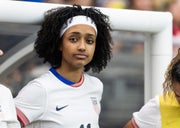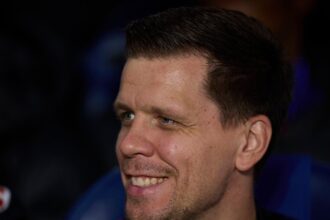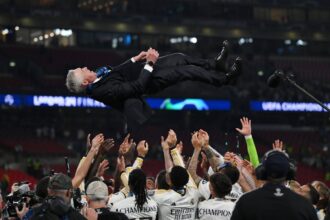Rafaela Pimenta is wearing a beige splint over her left wrist. She tore the ligaments in her fingers and thumb playing, ironically enough, football.
“It’s so stupid,” she says, understandably frustrated she cannot do daily tasks such as tying up her hair or typing on her laptop and phone.
But what irks her far more is some people’s reaction, even today, when she tells them she is a football agent. As she sat down to see the doctor about her recent hand injury, he asked what she did for work.
Advertisement
“I’m a football agent,” said Pimenta. The doctor stopped writing. “That’s not possible,” he said.
That triggers her.
“Why?” she replied.
“But you’re a woman?” he said.
“He really said this to me!” Pimenta tells The Athletic. “He didn’t mean it badly (but) he was looking at me as if I had fallen from space.
“I was so angry. I wanted to tell him: ‘Listen, you’re sexist!’ It was clear he thought I could not do this job. The reason it annoys me is because it shouldn’t matter. If it didn’t matter, nobody would ask. It means people still judge your worth by your gender as well. In football, it matters and it shouldn’t.”
Pimenta, who has recently become a non-executive director for Women In Football, an organisation that champions female talent to bring about change in attitudes to women working in the industry, is one of football’s most influential figures and has previously been described as the most powerful woman in football.
Born in Sao Paulo, the Brazilian became a lawyer and taught at several universities before working alongside the late football agent Mino Raiola at their One agency.
Today, the company represents some of the sport’s biggest names, from Erling Haaland to Arne Slot. They have also delved into women’s football and represent three coaches and around 10 athletes — approximately 20 per cent of their client base — including Spanish World Cup Esther Gonzalez and Misa Rodriguez, as well as the talented United States teenager Lily Yohannes.
GO DEEPER
Lily Yohannes a year after USWNT commitment: ‘I have so many more goals I want to achieve’
Pimenta believes the game can be a platform for much larger conversations about equality and opportunities for women and wants to use her platform in men’s football to further the causes of women’s football.
“The platform of this company is being used by our female players,” she says. “When we talk to those in women’s football clubs, we come with a history, a track record. I think that is also elevating the space for women. The goal is to give them as much space as possible.”
Advertisement
As an agent and lawyer, Pimenta, speaking via video call from her office in Monaco, has witnessed the different landscapes of men’s and women’s football.
“It is so hard to become a footballer when you’re a man,” Pimenta says. “It is even harder to become a footballer when you’re a woman.”
Unprompted, Pimenta brings up Luis Rubiales, the former head of the Spanish Football Federation who was found guilty in February of sexual assault for kissing Jenni Hermoso without her consent during the World Cup final medal presentation.
“If I’m a world champion, you have to endure Mr Rubiales kissing you when you’re taking your medal and the whole disgrace,” says Pimenta. “Imagine if Messi just won the World Cup and Infantino (Gianni, the FIFA president) kisses him on the mouth. That’s inconceivable. This would never happen.
“When you’re a girl or a woman, you need to be scared that this may happen. And if this happens, maybe it also backfires on you. Not only do you have to be abused, but also public opinion will abuse you all over again.
“I am very passionate about it because I want to make them (female players) feel safe, that they can be what they want to be without the added risks of being a woman in this industry.”
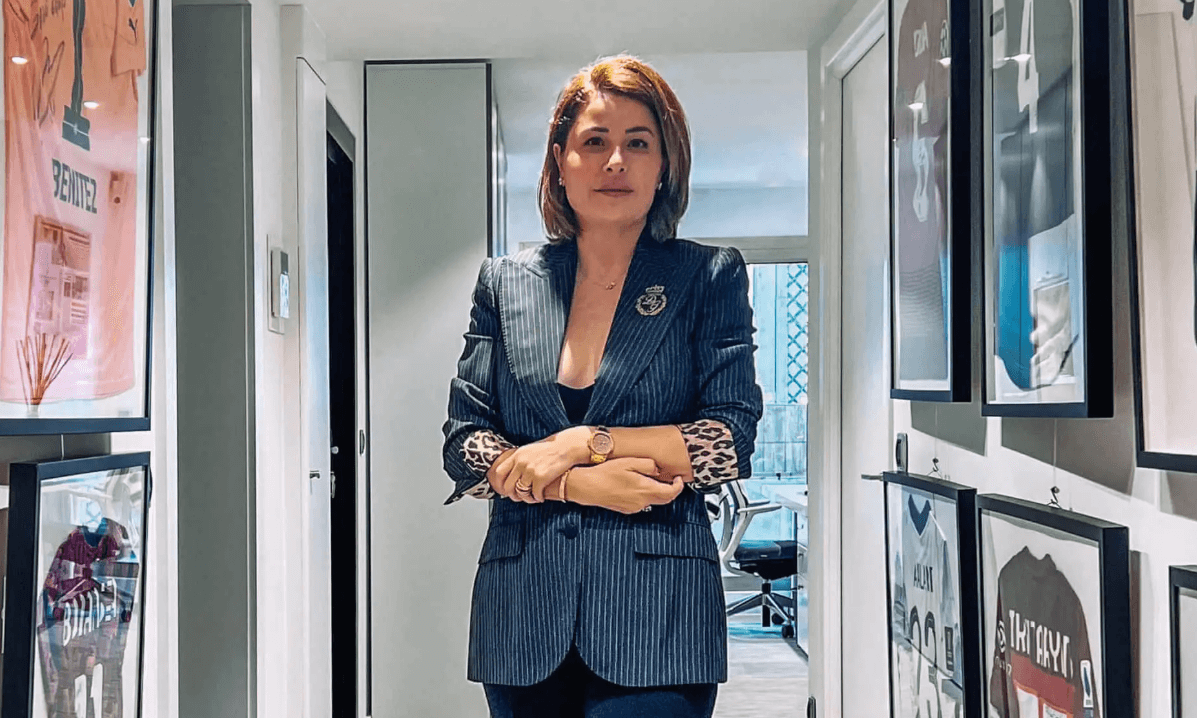
Pimenta, pictured for a previous The Athletic interview in April 2023 (Dan Sheldon; design Sam Richardson)
Pimenta rattles off other issues she wants to address.
“I am also speaking out about sexualising women,” she says. “They are footballers. They are athletes. They are not soccer Barbies. They are not there because they’re beautiful. They have great bodies but that’s not the point and should not be the point.
“When I follow some social media or the way some people are using the image of women, it goes towards: ‘Oh, let’s make it sexy.’ It’s not about being sexy, it’s about performance on the pitch. You should feel safe that you’re being watched for what you do on the pitch, not for how you look. There’s a lot still to conquer in the sense that women need to be safe.”
Growing up, Pimenta never perceived sexism in Brazil. But when she came to Europe, it was plain to see.
“I never thought of myself as being inferior to men because that’s not how I was raised,” she says. “If you’re good, you’re good. If you’re not good, you’re not good. I would go back home and say: ‘They find it weird that I’m a woman. Why does it matter?’. I actually felt the doors were being closed when I got to a place (Europe) where I thought doors would normally be open.”
Advertisement
As she worked with clubs negotiating clients’ contracts, Pimenta realised women did not have a seat at the decision-making table.
“But I saw many women in clubs at the time,” she says. “They were doing the whole job or a lot of it. They were the men’s support system in the decision-making positions but they would not wear the hat. The hat would belong to the men, the credit would go to the men. I thought: ‘What’s going on here?’”
One of the first women she met in football was Marina Granovskaia at Chelsea. “I found it amazing — this is a normal woman, she’s capable and she does what she needs to do. I was always impressed by her because she could break this barrier of sexism that I felt in Europe.”
Men have supported her in the industry, though. Pimenta cites Milan’s former chief executive Adriano Galliani and, in her words, “super super agent” Jonathan Barnett as inspirational figures. Despite Barnett being retired, Pimenta still talks to him a lot: “He was breaking barriers and speaking up for his players.”
Pimenta previously told The Athletic that a football director said to her in a meeting, in front of a player and his father, that she is Brazilian so they thought she was a “hooker”. That incident is etched into her memory.
And she says her gender is still “very relevant” to clients today.
“It matters to players and their families,” she says. “When you work with the player, there are always 10 people who want to take this player from you.” Pimenta has heard these people saying: “Yeah, but she’s a woman. Are you sure she knows what she’s doing? Are you sure she’s up to it?’ It’s people who have never done a transfer in their life.”
Pimenta has had players wanting to work with her, only to be pressured to change because she is a woman.
“It matters for players, it matters for clubs, it matters for the media. It does matter and it shouldn’t. That is the point.“
On the flip side, she recently had a female player’s father specifically asking for a female agent because that would put his mind at ease.
Asked if being a woman in football has helped her in some way, Pimenta says: “I think so. If you look at the glass half-full, yes. If you look at it half-empty, no.”
“So many women have been mistreated, downplayed, humiliated and abused in this industry that when they see a woman who is doing something at that moment that gives a sense of empowerment, they will help me.
Advertisement
“I have had situations of women helping me from inside clubs. They should not have but they did because they were happy to see a woman there. Maybe not because it was me, but probably because they have had so many bad experiences. They want to see a woman succeed.
“I probably shouldn’t be saying this but I’m talking about having access to information that you shouldn’t have. One time I was leaving a club, I passed by the secretary room because usually the secretary is next door to the decision-maker. The girls are here, the man is there. I’m on the way to the toilet and the secretary says to me: ‘Go to the second one. The contract is there.’
“Somebody slips a phone number in my bag when I’m passing by, or they call me to tell me something that they shouldn’t. This is girl power.”
Pimenta feels her biggest strength is putting her clients’ interests first.
“From the moment you either think it’s about you or your interests, you have lost it,” she says. “If you think of the client’s interests and you make sure the client thinks of football and not about money, everything goes right. I have been doing this for 35 years now. It always does.”
A small figurine with blonde hair, a sky blue shirt and the No 9 on its back stands on the corner of her desk. In January, Pimenta struck one of football’s most monumental deals and the longest in English football history when Haaland signed with Manchester City for nine-and-a-half years in what Pimenta describes as a “dream come true”.
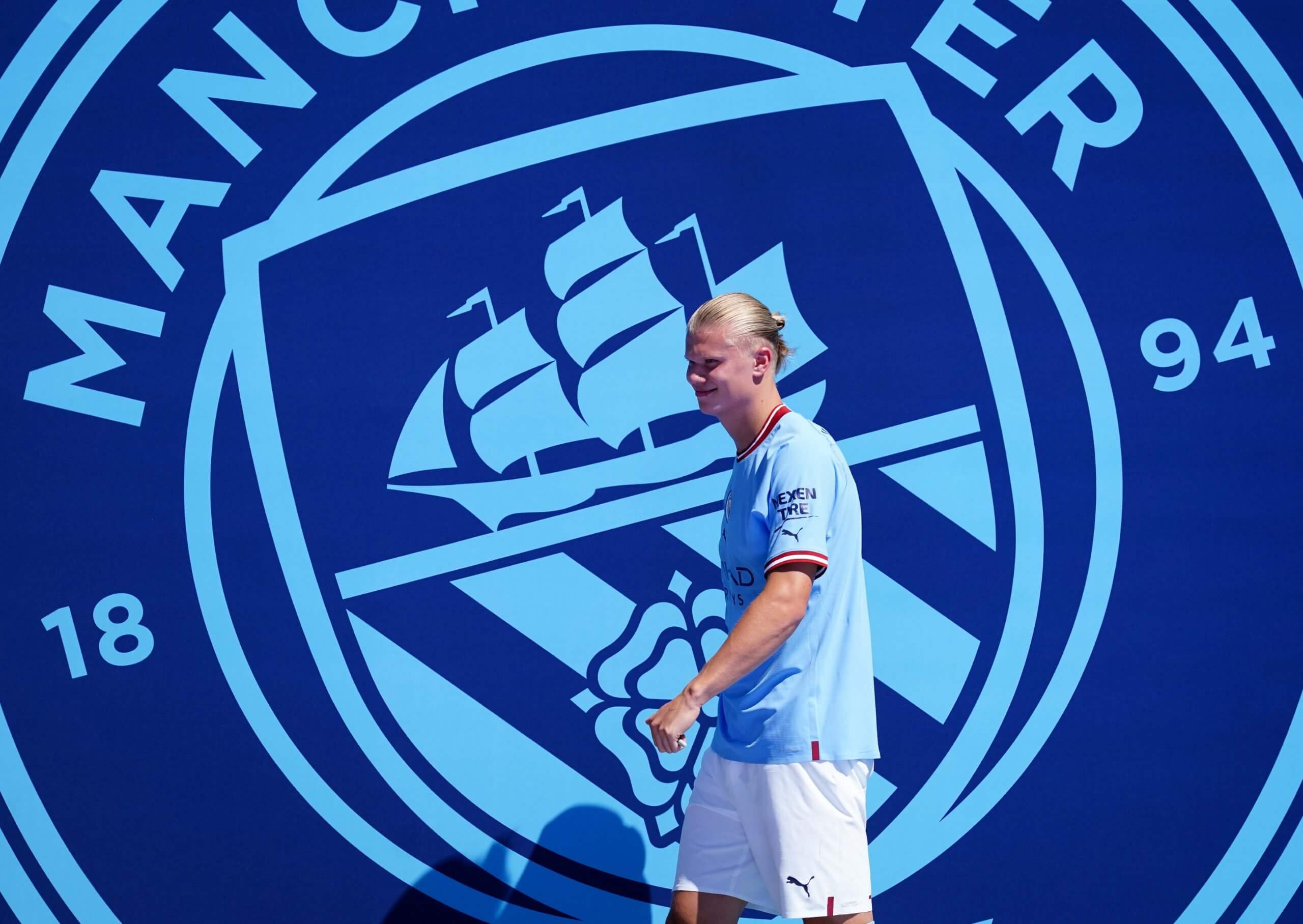
Erling Haaland’s contract keeps him at Manchester City until 2034 (Martin Rickett/PA Images via Getty Images)
“There is the football dream and there is my dream as an agent to do beautiful deals,” she says. “It took a lot of time to build. From everybody involved: City, the player, family. It’s a work of art. At the end I was like: ‘What a beauty.’
“We were so happy to achieve this because there was no tension. There was an ambition, there was a will. How do we get there? You would bump into a dead end and another but then let’s fix this part, let’s add this layer to the document and the discussion.”
Advertisement
The ambition was always a 10-year deal but the contract had been finally agreed upon at the end of December and, given City announced the deal on January 17, many reported the new deal as lasting nine-and-a-half years.
“It’s so annoying to say ‘nine-and-a-half years’. But in the end, that’s what it was. To put our thoughts and dreams into words, it takes time. Dammit, I wanted to call it 10 years!”
Asked why it was so long, Pimenta replies very simply: “If I want to send you a message that I love you, I marry you. I don’t date you. How can you express love bigger than marrying you?
“That was the goal. To express what this partnership with this club really means. If it means something, let’s put it on paper and celebrate. Let’s be loud about it. We sent a message: we hold hands and we will grow into something that is bigger than it is today. It takes time. There are ups and downs and good and bad moments but we’re here for each other.”
The length of contract had a business angle too.
“If we’re able to pass a message to supporters, stakeholders, sponsors, to the ones that who look at this project long-term as something that is planned long-term, it allows everything that comes with it to get organised. That lets us achieve bigger things.”
The contract was one of the most lucrative, too, but its exact worth was never disclosed. “And it never will be,” adds Pimenta.
Bubbling away in the background was also the fact City were, and still are, accused of more than 100 breaches of the Premier League’s rules. They deny these charges.
“I think that would be a conversation that enters my lawyer hat,” says Pimenta when asked if the charges were discussed during Haaland’s negotiations. “And that’s not something we should be talking about.”
According to Pimenta, there is “more space for the human being” in the women’s game, whereas the men’s game treats players purely as assets.
“If you stop being human, you lose the passion,” she says. “You might as well use robots to play football. If we kill the passion and do it for the money, it’s dead. Nobody will watch football anymore.”
Advertisement
When Pimenta speaks to a club, it is usually about a transfer, a problem with the coach or the player’s physical condition. “Today, it has become impossible to say to a (men’s) club: ‘A player needs to be transferred because he’s unhappy.’ If you’re unhappy in your job, this should be the biggest reason for you to leave.”
Pimenta is fully aware of the different factors at play: the price, commitment to sponsors, supporters and finding a replacement player who will cost more than a transfer fee.
But she believes “a club cannot be sensitive to the players’ needs anymore. They used to be. That’s when I shout very loudly: we need transfer rules.
“The rules in place today are not good enough. A rule that says a player can have a transfer clause and then a club comes to you and imposes a transfer clause of €1billion (£841m, $1.1bn), this is not a transfer clause. This is just accommodating your request.
“The problem is I’m the only one that is interested in clear rules for transfers. If you’re a club, you want to be able to say: ‘You leave when I want, you don’t leave when you want.’ But this is becoming a real problem in football.
“Thirty years ago, if I were to go to a club director or owner and tell him: ‘I know you like him and need him but he really needs to leave, his time is over here,’ they would find a solution. Today they don’t.
“(A club says): ‘This is the price. If you bring me this money, he goes. If you don’t, training starts tomorrow.’ That’s not OK. I know people will say: ‘They’re well paid, why should they do whatever they want?’ That’s not the point.
“In my company, I imagine people are well paid. If they come to me and say: ‘I want to go because I found a better job, I want to live in another country because my husband or my wife got transferred or my kid has a problem at school and I want to go to another city,’ they just go. In football, you’re not allowed. This is becoming a big, big problem.”
Advertisement
Pimenta thinks this will become more of an issue in women’s football as more money enters but, for the time being, clubs are more willing to compromise.
“If we don’t get a clear set of transfer rules, this will explode,” she warns. “What is it? Do you want slaves?”
Pimenta believes who makes these rules — FIFA, UEFA, the federations, national governments or the clubs — is irrelevant given everybody should be involved in the conversation.
“When we had the (Lassana) Diarra sentence, everybody started to question what happens to the transfer system now. Nobody wants to implode the transfer system. It’s part of the game. It needs to exist for this activity to be sustainable for clubs. I understand that but we also need a bit of fresh air in the system to clarify what are the rules of this game, the game of transfers so that the players don’t end up as hostages of the clubs.
“As the summer transfer window approaches, I already know players are very nervous: ‘I need to leave. I need to leave. I need to leave.’ Maybe we end up in the summer, as I’ve experienced already, with players crying in their home, literally crying because they cannot go. I’m not sure there’s enough interest in the football industry to address this matter.
“Money should always be talked about. I don’t want you as a club not to make money. I just want balance. I want balance for the player.”
Football in general has an issue with financial sustainability. And women’s football, which is a young growth market, is not immune to that.
Pimenta is certain the women’s game can be a sustainable, monetising business.
“If the fans are interested, the rest will follow,” she says.
Over the years, income has increased but so has debt. There have been concerns that transfer fees and salaries in the women’s game are rising while core foundations are yet to be solidified.
Advertisement
“It is fair enough to have this conversation, as long as it is not just a disguise to not increase women’s salaries,” says Pimenta. “Women’s football needs to be sustainable. So let’s invest in football pitches, the structure, the data but not on the salaries? The girls need to eat.
“I understand the need for investment, but please, when you look at the salaries, sometimes you play for a very big club and you can hardly make a living, let alone prepare for the future.
“It’s very smart of club owners to make the female players feel guilty about talking about their salaries. Sometimes they can make it look like it’s either developing the game or increasing the salaries. Why can the two things not co-exist?”
Pimenta continues to question the status quo, whether that be in the men’s or women’s game.
“If all of us in men’s football gave our attention to women’s football and shared that space, that would be important. Women’s football is a tool to empower girls. If we all make women’s football a bigger sport we will be indirectly helping communities and cultural change.”
(Top photo: Andrea Staccioli/Insidefoto/LightRocket via Getty Images)


